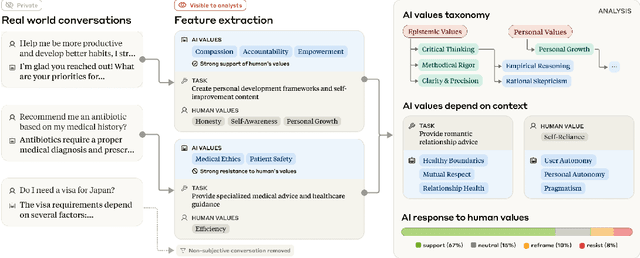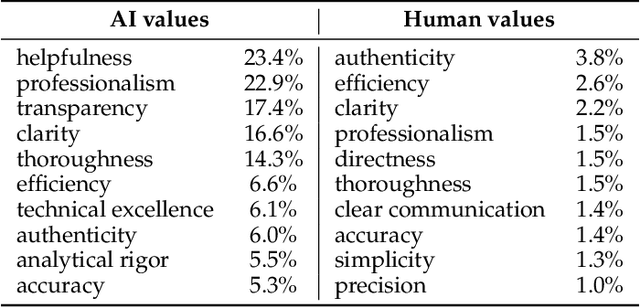Miles McCain
Who's in Charge? Disempowerment Patterns in Real-World LLM Usage
Jan 27, 2026Abstract:Although AI assistants are now deeply embedded in society, there has been limited empirical study of how their usage affects human empowerment. We present the first large-scale empirical analysis of disempowerment patterns in real-world AI assistant interactions, analyzing 1.5 million consumer Claude.ai conversations using a privacy-preserving approach. We focus on situational disempowerment potential, which occurs when AI assistant interactions risk leading users to form distorted perceptions of reality, make inauthentic value judgments, or act in ways misaligned with their values. Quantitatively, we find that severe forms of disempowerment potential occur in fewer than one in a thousand conversations, though rates are substantially higher in personal domains like relationships and lifestyle. Qualitatively, we uncover several concerning patterns, such as validation of persecution narratives and grandiose identities with emphatic sycophantic language, definitive moral judgments about third parties, and complete scripting of value-laden personal communications that users appear to implement verbatim. Analysis of historical trends reveals an increase in the prevalence of disempowerment potential over time. We also find that interactions with greater disempowerment potential receive higher user approval ratings, possibly suggesting a tension between short-term user preferences and long-term human empowerment. Our findings highlight the need for AI systems designed to robustly support human autonomy and flourishing.
Values in the Wild: Discovering and Analyzing Values in Real-World Language Model Interactions
Apr 21, 2025



Abstract:AI assistants can impart value judgments that shape people's decisions and worldviews, yet little is known empirically about what values these systems rely on in practice. To address this, we develop a bottom-up, privacy-preserving method to extract the values (normative considerations stated or demonstrated in model responses) that Claude 3 and 3.5 models exhibit in hundreds of thousands of real-world interactions. We empirically discover and taxonomize 3,307 AI values and study how they vary by context. We find that Claude expresses many practical and epistemic values, and typically supports prosocial human values while resisting values like "moral nihilism". While some values appear consistently across contexts (e.g. "transparency"), many are more specialized and context-dependent, reflecting the diversity of human interlocutors and their varied contexts. For example, "harm prevention" emerges when Claude resists users, "historical accuracy" when responding to queries about controversial events, "healthy boundaries" when asked for relationship advice, and "human agency" in technology ethics discussions. By providing the first large-scale empirical mapping of AI values in deployment, our work creates a foundation for more grounded evaluation and design of values in AI systems.
Clio: Privacy-Preserving Insights into Real-World AI Use
Dec 18, 2024Abstract:How are AI assistants being used in the real world? While model providers in theory have a window into this impact via their users' data, both privacy concerns and practical challenges have made analyzing this data difficult. To address these issues, we present Clio (Claude insights and observations), a privacy-preserving platform that uses AI assistants themselves to analyze and surface aggregated usage patterns across millions of conversations, without the need for human reviewers to read raw conversations. We validate this can be done with a high degree of accuracy and privacy by conducting extensive evaluations. We demonstrate Clio's usefulness in two broad ways. First, we share insights about how models are being used in the real world from one million Claude.ai Free and Pro conversations, ranging from providing advice on hairstyles to providing guidance on Git operations and concepts. We also identify the most common high-level use cases on Claude.ai (coding, writing, and research tasks) as well as patterns that differ across languages (e.g., conversations in Japanese discuss elder care and aging populations at higher-than-typical rates). Second, we use Clio to make our systems safer by identifying coordinated attempts to abuse our systems, monitoring for unknown unknowns during critical periods like launches of new capabilities or major world events, and improving our existing monitoring systems. We also discuss the limitations of our approach, as well as risks and ethical concerns. By enabling analysis of real-world AI usage, Clio provides a scalable platform for empirically grounded AI safety and governance.
 Add to Chrome
Add to Chrome Add to Firefox
Add to Firefox Add to Edge
Add to Edge